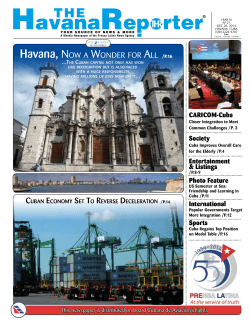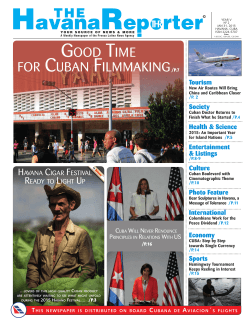
First take
First take December 18, 2014 A publication of PwC’s financial services regulatory practice Key points from the President’s announcement on Cuba sanctions On December 17th, President Obama announced sweeping changes to the current economic sanctions levied against Cuba, starting with an establishment of diplomatic relations. The sanctions against Cuba were first introduced in 1960 in response to the Castro government’s takeover and subsequent nationalization of US-owned properties. The sanctions were made more stringent in 1963 as a result of the new Cuban government’s alignment with the Soviet Union during the Cold War. Presently, the sanctions are comprehensive with significant prohibitions on dealings with Cuban nationals and businesses. The few financial institutions in the US that are authorized to transact with Cuba are subject to a licensing and oversight regime by the US Office of Foreign Assets Control (“OFAC”). Under the announced changes by the President, there will be an increased ability to transact with Cuban nationals and businesses, including Cuban financial institutions. 1. Limited overall financial benefit to US banks, but an important development: The easing of Cuban sanctions may not yield a significant financial windfall for US financial institutions, but the symbolism of easing one of the lengthiest and most comprehensive sanctions programs in history is important. Ultimately, with the reduction of sanctions and increased commerce and business development between Cuba and the US, the Cuban economy may increase its prominence in the region. 2. US banks can now directly access the Cuban financial system: Currently, US financial institutions must transfer funds to and receive funds from Cuba via identified accounts in thirdcountry banks – even those US institutions authorized to facilitate permissible funds transfers. The ability to enter (or re-enter) the Cuban market for many US financial institutions may be swift due to existing financial infrastructure in Cuba. A provision of the announced change will permit US institutions to open correspondent accounts at Cuban financial institutions to facilitate transaction processing. Additionally, travelers will be able to use US credit and debit cards in Cuba. The revised sanctions program will likely provide clear guidelines regarding thresholds and categories of business that will be allowed, easing the ability to operationalize compliance programs. 3. Some positive financial impact on the US financial services sector: Presently, roughly $2 billion in personal remittances is sent to Cuba annually from the US. Since US financial institutions will be able to access the Cuban financial system directly for the first time in decades, it will be easier for firms to begin or continue providing such services. Remittanceforwarders to Cuba, that previously had to be licensed by OFAC, will no longer be required to maintain a license to operate. Furthermore, remittance levels will be raised from $500 to $2,000 per quarter for remittances to Cuban nationals, which will likely increase transaction volume. US-owned or controlled financial institutions located in countries outside of the US or Cuba will also now be allowed to engage in financial transactions with Cuban nationals who relocated to third-countries. The blocked accounts of such Cuban nationals at US financial institutions in third-countries will be unblocked. This too will allow US financial institutions to provide additional services to Cuban nationals. Finally, more opportunity will exist for financial institutions to provide services in connection with commerce between the US and Cuba. The ability to engage in additional authorized commercial sales and exports from the US will support the Cuban private sector while creating new business opportunities in trade finance for US financial institutions. In addition, the ability to utilize US credit and debit cards in Cuba will allow US financial institutions to provide these services. First take – PwC 4. The announced changes will not take effect until OFAC issues regulations: Changes in the Cuba sanctions program will not take effect until OFAC implements the changes to the Cuban Assets Control Regulations. Shortly after the President’s announcement, OFAC released a document highlighting the changes it expects to implement. OFAC also notified financial institutions that it expects to formally amend current regulations in the coming weeks. 5. Banks should assess the compliance risk of entering the Cuban market: Institutions considering entry into the Cuban market should assess the potential risk of violating remaining (or future possible) US prohibitions and restrictions. At a minimum, policies and procedures will need to be revised, subject to senior management and board approval, and adequate compliance controls should be put in place. Not all institutions will be comfortable moving forward with a business plan involving Cuba. Over the years (typically corresponding with changes in the US administration), the stringency of US sanctions has waxed and waned. As a result, until the program is lifted entirely (which requires an act of Congress), there is risk in starting or expanding business operations in Cuba. 2 www.pwcregulatory.com Additional information For additional information about PwC’s Financial Services Regulatory Practice and how we can help you, please contact: Dan Ryan Financial Services Advisory Leader 646 471 8488 daniel.ryan@us.pwc.com Jeff Lavine Partner, Financial Services Regulatory Advisory 703 918 1379 jeff.lavine@us.pwc.com David Sapin Partner, Financial Services Regulatory Advisory 646 471 8481 david.sapin@us.pwc.com Armen Meyer Director of Regulatory Strategy 646 531 4519 armen.meyer@us.pwc.com Contributors: Daniel Tannebaum and Amber Stokes. To learn more about financial services regulation from your iPad or iPhone, click here to download PwC’s new Regulatory Navigator App from the Apple App Store. Follow us on Twitter @PwC_US_FinSrvcs © 2014 PricewaterhouseCoopers LLP, a Delaware limited liability partnership. All rights reserved. PwC refers to the US member firm, and may sometimes refer to the PwC network. Each member firm is a separate legal entity. Please see www.pwc.com/structure for further details. This content is for general information purposes only, and should not be used as a substitute for consultation with professional advisors. PwC US helps organizations and individuals create the value they’re looking for. We’re a member of the PwC network of firms in 158 countries with more than 180,000 people. We’re committed to delivering quality in assurance, tax and advisory services. Tell us what matters to you and find out more by visiting us at www.pwc.com/us.
© Copyright 2025





















